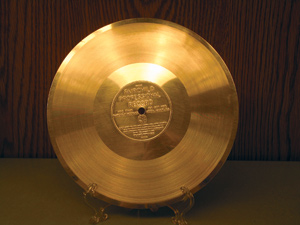|
||
      |
Original Source
Safe and sound
 During
his Depression-era travels through Mexico and Guatemala, Chicago linguist
Manuel Andrade recorded a dozen obscure Mesoamerican languages. Each needle-cut
aluminum disc he used, like the one at right, recorded only about six
minutes, but Andrade filled hundreds. His discs—together with Edison
wax cylinders, motion-picture films, and audiotapes spanning a century
of linguistic inquiry at Chicago—provide a link to rapidly vanishing
languages. This summer a team of University linguists, archivists, and
computer scientists embarked on a two-year preservation project to digitize
some 850 hours of recordings. They’ll also upload them to the Web,
providing access not only to colleagues around the globe but also to native
speakers of languages like Meskwaki, Inuktitut, Yucatec Maya, and Tzeltal.
During
his Depression-era travels through Mexico and Guatemala, Chicago linguist
Manuel Andrade recorded a dozen obscure Mesoamerican languages. Each needle-cut
aluminum disc he used, like the one at right, recorded only about six
minutes, but Andrade filled hundreds. His discs—together with Edison
wax cylinders, motion-picture films, and audiotapes spanning a century
of linguistic inquiry at Chicago—provide a link to rapidly vanishing
languages. This summer a team of University linguists, archivists, and
computer scientists embarked on a two-year preservation project to digitize
some 850 hours of recordings. They’ll also upload them to the Web,
providing access not only to colleagues around the globe but also to native
speakers of languages like Meskwaki, Inuktitut, Yucatec Maya, and Tzeltal.
“People wonder if disappearing languages are important to linguistic science,” says linguist, computer scientist, and project leader John Goldsmith. “The answer is yes. Linguists look for commonalities behind the particularities.” Chicago’s repository of stories and grammar is “invaluable,” Goldsmith says, because esoteric languages often yield profound discoveries. “If you only study the two dozen major world languages, it’s like trying to study evolution with only a couple dozen species. You could do it, but you’d be missing a lot.”